人教版(2019)选择性必修 第一册Unit 2 Looking into the Future Discover Useful Structures-课件(共39张)
文档属性
| 名称 | 人教版(2019)选择性必修 第一册Unit 2 Looking into the Future Discover Useful Structures-课件(共39张) |
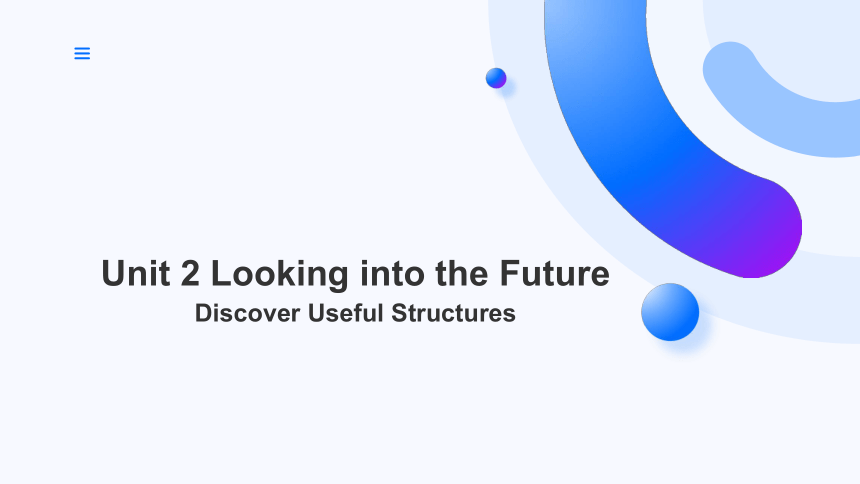
|
|
| 格式 | pptx | ||
| 文件大小 | 893.0KB | ||
| 资源类型 | 教案 | ||
| 版本资源 | 人教版(2019) | ||
| 科目 | 英语 | ||
| 更新时间 | 2025-03-04 14:23:57 | ||
图片预览


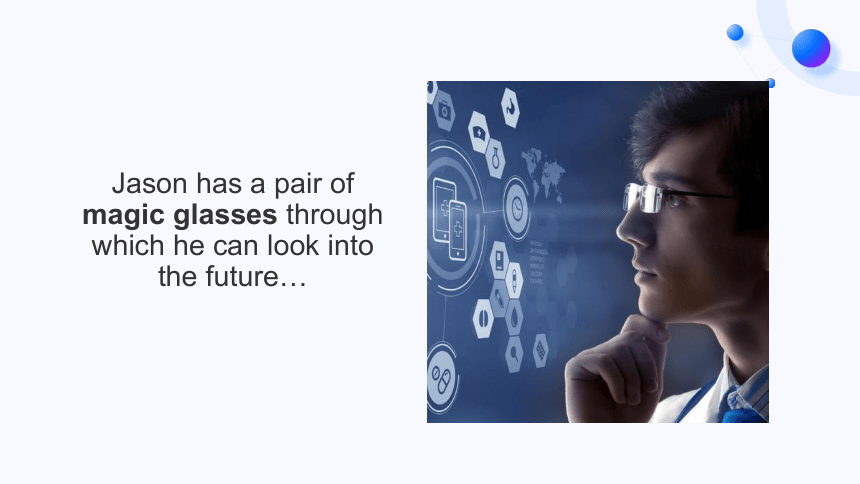
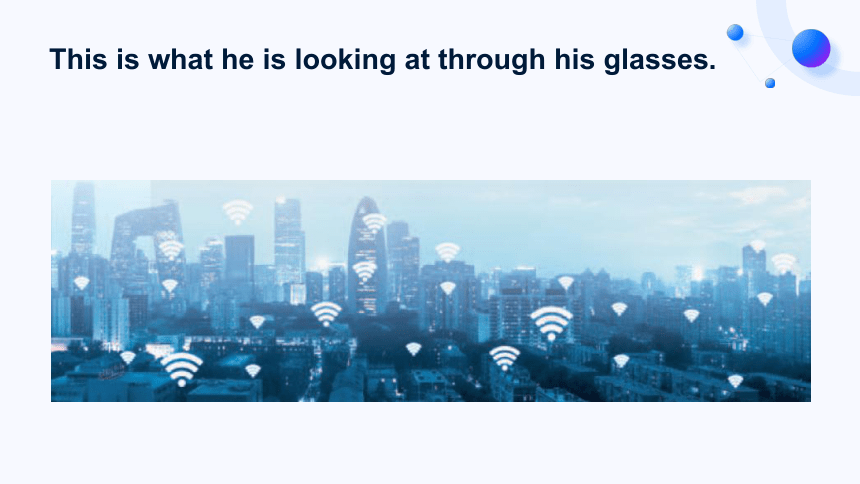

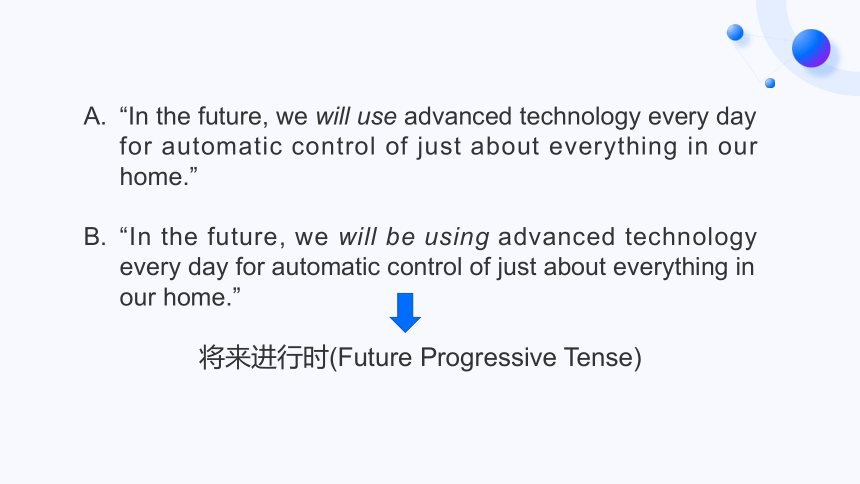
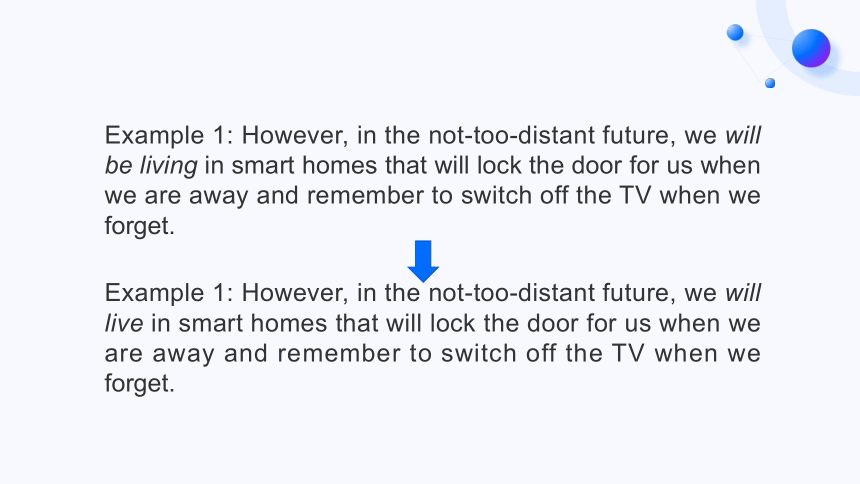
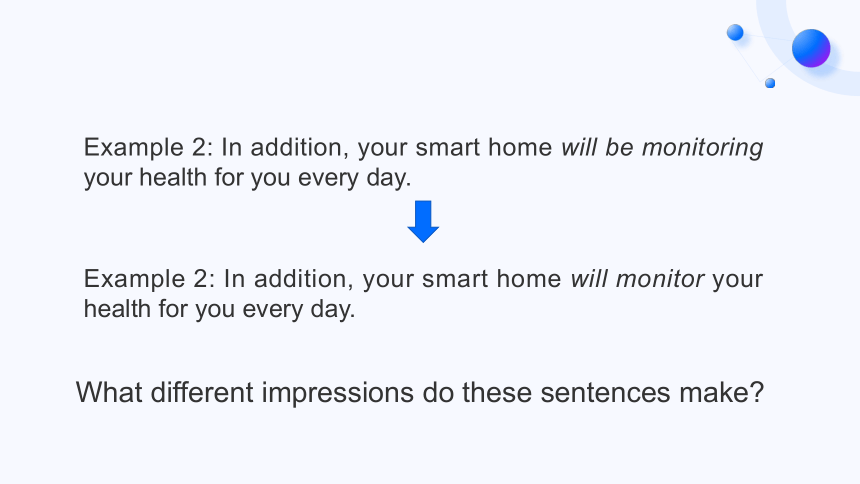
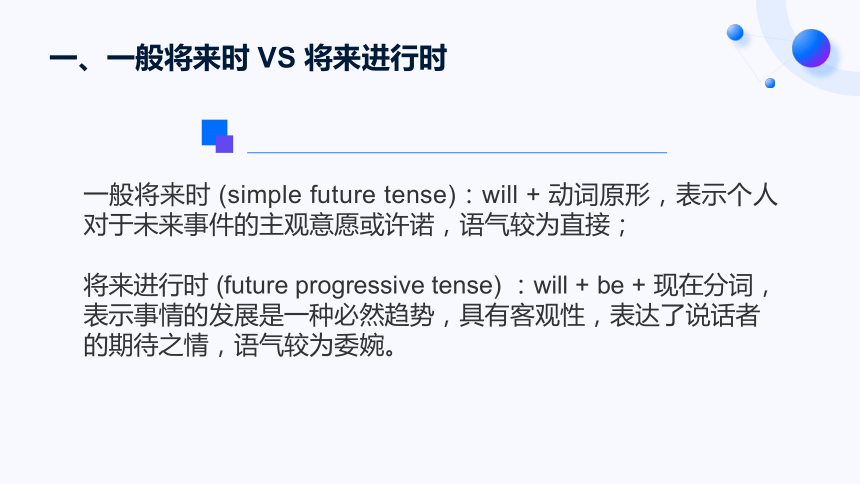
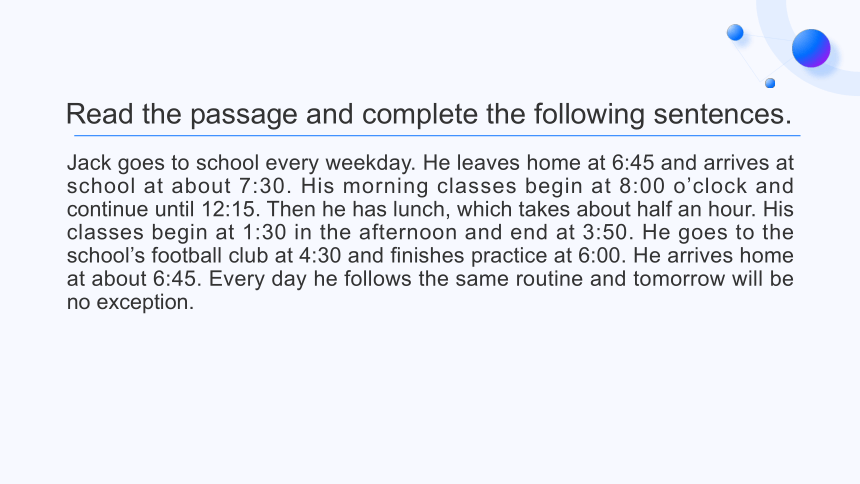
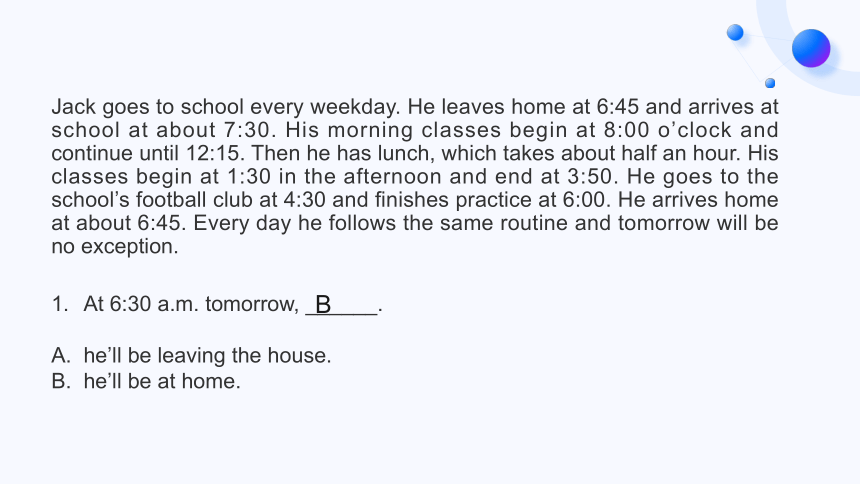
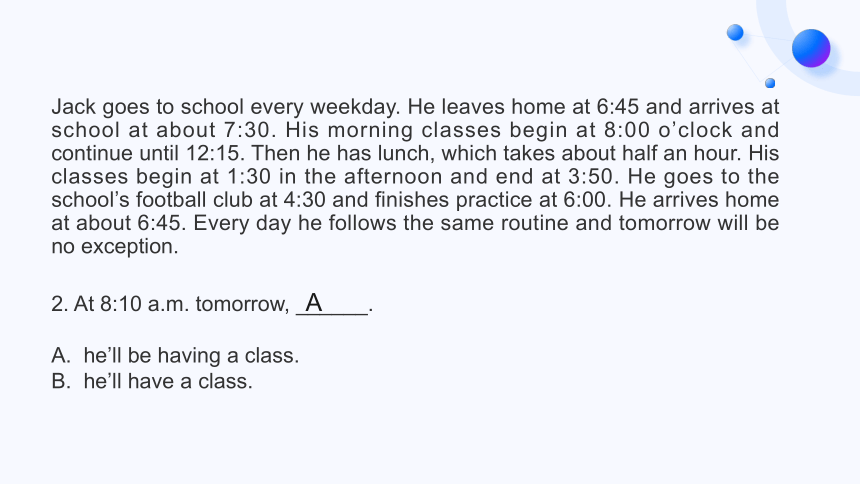
文档简介
(共39张PPT)
Unit 2 Looking into the Future
Discover Useful Structures
In this class, you will
Learning Objectives
learn how to identify and analyse the forms and meanings of the future progressive tense;
use the future progressive tense to describe an ongoing activity in the future.
Jason has a pair of magic glasses through which he can look into the future…
This is what he is looking at through his glasses.
Jason is amazed at what he’s looking at and says…
“In the future, we will use advanced technology every day for automatic control of just about everything in our home.”
“In the future, we will be using advanced technology every day for automatic control of just about everything in our home.”
将来进行时(Future Progressive Tense)
“In the future, we will use advanced technology every day for automatic control of just about everything in our home.”
“In the future, we will be using advanced technology every day for automatic control of just about everything in our home.”
Example 1: However, in the not-too-distant future, we will be living in smart homes that will lock the door for us when we are away and remember to switch off the TV when we forget.
Example 1: However, in the not-too-distant future, we will live in smart homes that will lock the door for us when we are away and remember to switch off the TV when we forget.
Example 2: In addition, your smart home will be monitoring your health for you every day.
Example 2: In addition, your smart home will monitor your health for you every day.
What different impressions do these sentences make
一般将来时 (simple future tense):will + 动词原形,表示个人对于未来事件的主观意愿或许诺,语气较为直接;
将来进行时 (future progressive tense) :will + be + 现在分词,表示事情的发展是一种必然趋势,具有客观性,表达了说话者的期待之情,语气较为委婉。
一、一般将来时 VS 将来进行时
Read the passage and complete the following sentences.
Jack goes to school every weekday. He leaves home at 6:45 and arrives at school at about 7:30. His morning classes begin at 8:00 o’clock and continue until 12:15. Then he has lunch, which takes about half an hour. His classes begin at 1:30 in the afternoon and end at 3:50. He goes to the school’s football club at 4:30 and finishes practice at 6:00. He arrives home at about 6:45. Every day he follows the same routine and tomorrow will be no exception.
Jack goes to school every weekday. He leaves home at 6:45 and arrives at school at about 7:30. His morning classes begin at 8:00 o’clock and continue until 12:15. Then he has lunch, which takes about half an hour. His classes begin at 1:30 in the afternoon and end at 3:50. He goes to the school’s football club at 4:30 and finishes practice at 6:00. He arrives home at about 6:45. Every day he follows the same routine and tomorrow will be no exception.
At 6:30 a.m. tomorrow, ______.
he’ll be leaving the house.
he’ll be at home.
B
Jack goes to school every weekday. He leaves home at 6:45 and arrives at school at about 7:30. His morning classes begin at 8:00 o’clock and continue until 12:15. Then he has lunch, which takes about half an hour. His classes begin at 1:30 in the afternoon and end at 3:50. He goes to the school’s football club at 4:30 and finishes practice at 6:00. He arrives home at about 6:45. Every day he follows the same routine and tomorrow will be no exception.
2. At 8:10 a.m. tomorrow, ______.
he’ll be having a class.
he’ll have a class.
A
Jack goes to school every weekday. He leaves home at 6:45 and arrives at school at about 7:30. His morning classes begin at 8:00 o’clock and continue until 12:15. Then he has lunch, which takes about half an hour. His classes begin at 1:30 in the afternoon and end at 3:50. He goes to the school’s football club at 4:30 and finishes practice at 6:00. He arrives home at about 6:45. Every day he follows the same routine and tomorrow will be no exception.
3. At 12:30 tomorrow, ______.
he’ll be having lunch.
he’ll have lunch.
A
Jack goes to school every weekday. He leaves home at 6:45 and arrives at school at about 7:30. His morning classes begin at 8:00 o’clock and continue until 12:15. Then he has lunch, which takes about half an hour. His classes begin at 1:30 in the afternoon and end at 3:50. He goes to the school’s football club at 4:30 and finishes practice at 6:00. He arrives home at about 6:45. Every day he follows the same routine and tomorrow will be no exception.
4. At 5:00 p.m. tomorrow, ______.
he’ll be practicing football.
he’ll practice football.
A
Jack goes to school every weekday. He leaves home at 6:45 and arrives at school at about 7:30. His morning classes begin at 8:00 o’clock and continue until 12:15. Then he has lunch, which takes about half an hour. His classes begin at 1:30 in the afternoon and end at 3:50. He goes to the school’s football club at 4:30 and finishes practice at 6:00. He arrives home at about 6:45. Every day he follows the same routine and tomorrow will be no exception.
5. At 6:45 p.m. tomorrow, ______.
he’ll be arriving home.
he’ll arrive home.
A
二、将来进行时的用法
表示发生在未来的一种个人习惯或者日常规划;
表示从将来某一时间开始,并继续下去的动作。一般用延续性动词来表示。
You can call me then. I ________________ (not sleep).
They set off at 9:00 a.m. and thought they ______________ (reach) the airport an hour later.
Will you _________ (wait) for me until I find the electrical wires
won’t be sleeping
would reach
wait
Fill in the blanks with proper forms of the verbs in brackets.
Fill in the blanks with proper forms of the verbs in brackets.
4. Better not hang out with Sam then. He ______________ (work) on his article on critical thinking.
5. I guess most parents ______________ (support) the new plan at the meeting tomorrow.
6. Don’t call me between 12:30 and 13:00. I ____________ (take) a nap.
will be working
will support
will be taking
Fill in the blanks with proper forms of the verbs in brackets.
7. After the training, the farmers decided that they _________________________ (grow) tomatoes the next year.
8. The engineer was sure that the medical tests ______________ (show) that he was healthy.
9. If you need to contact me, I ________________ (stay) at the Waterfall Hotel until this Saturday.
would grow/would be growing
would show
will be staying
Example:
Next month I’ll go on holiday to a coastal city. I…
Next month I’ll go on holiday to a coastal city. I will be lying on the beach, sunbathing, or swimming in the sea.
Write down as many possible sentences as you can for the following situations.
1. You’d better not call me this afternoon. I…
2. Sam is injured. He…
3. You won’t see me again. I will…
4. A: What does the forecast say about the weather next week
B: It will be very wet, and…
5. A: Are you travelling somewhere this summer holiday
B: No, I…
Write down as many possible sentences as you can for the following situations.
Suggested Answers:
1. You’d better not call me this afternoon. I…
You’d better not call me this afternoon. I will be taking a nap.
2. Sam is injured. He…
Sam is injured. He will not be taking part in the basketball game.
Write down as many possible sentences as you can for the following situations.
3. You won’t see me again. I will…
You won’t see me again. I will be moving to Beijing next month, and I am not planning on coming back.
4. A: What does the forecast say about the weather next week
B: It will be very wet, and…
It will be very wet, and it will be raining for the whole week.
Write down as many possible sentences as you can for the following situations.
5. A: Are you travelling somewhere this summer holiday
B: No, I…
No, I’ll be staying home and working.
Write down as many possible sentences as you can for the following situations.
Monday Fly to Beijing from Melbourne, arrive at 10:00 a.m.; Visit the Summer Palace in the afternoon
Tuesday Morning: visit the Palace Museum;
Afternoon: go to Wangfujing Street
Wednesday Go to the Great Wall, three hours’ drive there and back
Read the travel plan and make up a conversation using the future progressive tense.
Thursday Go sightseeing in Shichahai;
Visit National Museum of China
Friday Trip to Zhangjiakou
Saturday Back to Beijing in the afternoon;
Watch Beijing Opera at the Mei Lanfang Theatre
Sunday Return to Melbourne
Read the travel plan and make up a conversation using the future progressive tense.
Jane: So do you have your plan for the trip
Sam: Oh, yes. It’s all been organized.
Jane: When will you be arriving in Beijing
Sam: Around ten in the morning. Then I’ll be visiting the Summer Palace.
Monday Fly to Beijing from Melbourne, arrive at 10:00 a.m.; Visit the Summer Palace in the afternoon
Tuesday Morning: visit the Palace Museum;
Afternoon: go to Wangfujing Street
Wednesday Go to the Great Wall, three hours’ drive there and back
Sample Dialogue
Jane: After such a long trip You’ll be pretty tired.
Sam: Yeah, but I can’t wait to go. And then on Tuesday, I’ll be visiting the Palace Museum in the morning and I’ll be buying souvenirs in Wangfujing Street in the afternoon.
Monday Fly to Beijing from Melbourne, arrive at 10:00 a.m.; Visit the Summer Palace in the afternoon
Tuesday Morning: visit the Palace Museum;
Afternoon: go to Wangfujing Street
Wednesday Go to the Great Wall, three hours’ drive there and back
Sample Dialogue
Jane: When will you be climbing the Great Wall
Sam: Wednesday. Since it takes three hours to drive there and back, I won’t have other arrangement that day.
Jane: Then what will you be doing on Thursday
Monday Fly to Beijing from Melbourne, arrive at 10:00 a.m.; Visit the Summer Palace in the afternoon
Tuesday Morning: visit the Palace Museum;
Afternoon: go to Wangfujing Street
Wednesday Go to the Great Wall, three hours’ drive there and back
Sample Dialogue
Thursday Go sightseeing in Shichahai;
Visit National Museum of China
Friday Trip to Zhangjiakou
Saturday Back to Beijing in the afternoon;
Watch Beijing Opera at the Mei Lanfang Theatre
Sunday Return to Melbourne
Sample Dialogue
Sam: I will be going sightseeing in Shichahai in the morning and visiting the National Museum of China in the afternoon.
Jane: That’s great! Will you be going to Zhangjiakou It is the co-host city of the 2022 Winter Olympics.
Thursday Go sightseeing in Shichahai;
Visit National Museum of China
Friday Trip to Zhangjiakou
Saturday Back to Beijing in the afternoon;
Watch Beijing Opera at the Mei Lanfang Theatre
Sunday Return to Melbourne
Sample Dialogue
Sam: Yes, it is in our plan. We’ll be travelling to Zhangjiakou on Friday.
Jane: Fantastic! When will you be back to Beijing
Sam: We will be going back on Saturday afternoon. And we will be watching Beijing Opera at the Mei Lanfang Theatre.
Thursday Go sightseeing in Shichahai;
Visit National Museum of China
Friday Trip to Zhangjiakou
Saturday Back to Beijing in the afternoon;
Watch Beijing Opera at the Mei Lanfang Theatre
Sunday Return to Melbourne
Sample Dialogue
Jane: I’m sure you will have a great experience with traditional Chinese culture. Do you have any plans for Sunday
Sam: How I wish! Actually we will be returning to Melbourne as scheduled.
Dear Future Me,
How are you If you’re still very hard-working, then I’m sure you’re __________ (keep) yourself busy! I do __________ (hope) you’re healthier, though. I know I love eating too much junk food and far too many sweets. I hope you’re stronger than me and ______________ (give up) these bad habits.
Below is a letter from the present you to the future you. Try to complete it with the most appropriate verb forms.
keeping
hope
have given up
How’s everything going with work Do you remember that you __________ (want) to be a pilot If you do, then I hope you’re flying around the world to fun places and __________ (do) a lot of sightseeing. I think that the computer technology in your time must __________ (be) so much better than it is now.
Below is a letter from the present you to the future you. Try to complete it with the most appropriate verb forms.
wanted
doing
be
The way things are going right now, people will no longer __________ (drive) cars one day because computers __________ (operate) them completely. Moreover, companies will probably __________ (try) to do the same thing with planes soon afterwards.
Below is a letter from the present you to the future you. Try to complete it with the most appropriate verb forms.
be driving
will operate
try
I think it would be quite dangerous if all the cars on the road were driverless. However, I think the idea of __________ (have) any pilots on a plane is much more dangerous. This is because any big computer problem could cause one or more planes full of people to crash!
Below is a letter from the present you to the future you. Try to complete it with the most appropriate verb forms.
not having
I hope I’m right about planes still __________ (need) pilots, but if I’m wrong, I look forward to __________ (find) out what other job you chose for your career.
Your friend,
Present Me
Below is a letter from the present you to the future you. Try to complete it with the most appropriate verb forms.
needing
finding
三、将来进行时的用法总结
表示事情的发展是一种必然趋势,具有客观性,表达了说话者的期待之情,语气较为委婉;
表示发生在未来的一种个人习惯或者日常规划;
表示从将来某一时间开始,并继续下去的动作。一般用延续性动词来表示。
完成下面的写作任务,要求如下:
Write a letter from the present you to the future you, presenting a potential problem in your future career that might be caused by future advances in technology. You are required to include:
the name of your possible future career;
the potential problem that is caused by future advances in technology;
the possible effect(s) of the problem.
Homework
Unit 2 Looking into the Future
Discover Useful Structures
In this class, you will
Learning Objectives
learn how to identify and analyse the forms and meanings of the future progressive tense;
use the future progressive tense to describe an ongoing activity in the future.
Jason has a pair of magic glasses through which he can look into the future…
This is what he is looking at through his glasses.
Jason is amazed at what he’s looking at and says…
“In the future, we will use advanced technology every day for automatic control of just about everything in our home.”
“In the future, we will be using advanced technology every day for automatic control of just about everything in our home.”
将来进行时(Future Progressive Tense)
“In the future, we will use advanced technology every day for automatic control of just about everything in our home.”
“In the future, we will be using advanced technology every day for automatic control of just about everything in our home.”
Example 1: However, in the not-too-distant future, we will be living in smart homes that will lock the door for us when we are away and remember to switch off the TV when we forget.
Example 1: However, in the not-too-distant future, we will live in smart homes that will lock the door for us when we are away and remember to switch off the TV when we forget.
Example 2: In addition, your smart home will be monitoring your health for you every day.
Example 2: In addition, your smart home will monitor your health for you every day.
What different impressions do these sentences make
一般将来时 (simple future tense):will + 动词原形,表示个人对于未来事件的主观意愿或许诺,语气较为直接;
将来进行时 (future progressive tense) :will + be + 现在分词,表示事情的发展是一种必然趋势,具有客观性,表达了说话者的期待之情,语气较为委婉。
一、一般将来时 VS 将来进行时
Read the passage and complete the following sentences.
Jack goes to school every weekday. He leaves home at 6:45 and arrives at school at about 7:30. His morning classes begin at 8:00 o’clock and continue until 12:15. Then he has lunch, which takes about half an hour. His classes begin at 1:30 in the afternoon and end at 3:50. He goes to the school’s football club at 4:30 and finishes practice at 6:00. He arrives home at about 6:45. Every day he follows the same routine and tomorrow will be no exception.
Jack goes to school every weekday. He leaves home at 6:45 and arrives at school at about 7:30. His morning classes begin at 8:00 o’clock and continue until 12:15. Then he has lunch, which takes about half an hour. His classes begin at 1:30 in the afternoon and end at 3:50. He goes to the school’s football club at 4:30 and finishes practice at 6:00. He arrives home at about 6:45. Every day he follows the same routine and tomorrow will be no exception.
At 6:30 a.m. tomorrow, ______.
he’ll be leaving the house.
he’ll be at home.
B
Jack goes to school every weekday. He leaves home at 6:45 and arrives at school at about 7:30. His morning classes begin at 8:00 o’clock and continue until 12:15. Then he has lunch, which takes about half an hour. His classes begin at 1:30 in the afternoon and end at 3:50. He goes to the school’s football club at 4:30 and finishes practice at 6:00. He arrives home at about 6:45. Every day he follows the same routine and tomorrow will be no exception.
2. At 8:10 a.m. tomorrow, ______.
he’ll be having a class.
he’ll have a class.
A
Jack goes to school every weekday. He leaves home at 6:45 and arrives at school at about 7:30. His morning classes begin at 8:00 o’clock and continue until 12:15. Then he has lunch, which takes about half an hour. His classes begin at 1:30 in the afternoon and end at 3:50. He goes to the school’s football club at 4:30 and finishes practice at 6:00. He arrives home at about 6:45. Every day he follows the same routine and tomorrow will be no exception.
3. At 12:30 tomorrow, ______.
he’ll be having lunch.
he’ll have lunch.
A
Jack goes to school every weekday. He leaves home at 6:45 and arrives at school at about 7:30. His morning classes begin at 8:00 o’clock and continue until 12:15. Then he has lunch, which takes about half an hour. His classes begin at 1:30 in the afternoon and end at 3:50. He goes to the school’s football club at 4:30 and finishes practice at 6:00. He arrives home at about 6:45. Every day he follows the same routine and tomorrow will be no exception.
4. At 5:00 p.m. tomorrow, ______.
he’ll be practicing football.
he’ll practice football.
A
Jack goes to school every weekday. He leaves home at 6:45 and arrives at school at about 7:30. His morning classes begin at 8:00 o’clock and continue until 12:15. Then he has lunch, which takes about half an hour. His classes begin at 1:30 in the afternoon and end at 3:50. He goes to the school’s football club at 4:30 and finishes practice at 6:00. He arrives home at about 6:45. Every day he follows the same routine and tomorrow will be no exception.
5. At 6:45 p.m. tomorrow, ______.
he’ll be arriving home.
he’ll arrive home.
A
二、将来进行时的用法
表示发生在未来的一种个人习惯或者日常规划;
表示从将来某一时间开始,并继续下去的动作。一般用延续性动词来表示。
You can call me then. I ________________ (not sleep).
They set off at 9:00 a.m. and thought they ______________ (reach) the airport an hour later.
Will you _________ (wait) for me until I find the electrical wires
won’t be sleeping
would reach
wait
Fill in the blanks with proper forms of the verbs in brackets.
Fill in the blanks with proper forms of the verbs in brackets.
4. Better not hang out with Sam then. He ______________ (work) on his article on critical thinking.
5. I guess most parents ______________ (support) the new plan at the meeting tomorrow.
6. Don’t call me between 12:30 and 13:00. I ____________ (take) a nap.
will be working
will support
will be taking
Fill in the blanks with proper forms of the verbs in brackets.
7. After the training, the farmers decided that they _________________________ (grow) tomatoes the next year.
8. The engineer was sure that the medical tests ______________ (show) that he was healthy.
9. If you need to contact me, I ________________ (stay) at the Waterfall Hotel until this Saturday.
would grow/would be growing
would show
will be staying
Example:
Next month I’ll go on holiday to a coastal city. I…
Next month I’ll go on holiday to a coastal city. I will be lying on the beach, sunbathing, or swimming in the sea.
Write down as many possible sentences as you can for the following situations.
1. You’d better not call me this afternoon. I…
2. Sam is injured. He…
3. You won’t see me again. I will…
4. A: What does the forecast say about the weather next week
B: It will be very wet, and…
5. A: Are you travelling somewhere this summer holiday
B: No, I…
Write down as many possible sentences as you can for the following situations.
Suggested Answers:
1. You’d better not call me this afternoon. I…
You’d better not call me this afternoon. I will be taking a nap.
2. Sam is injured. He…
Sam is injured. He will not be taking part in the basketball game.
Write down as many possible sentences as you can for the following situations.
3. You won’t see me again. I will…
You won’t see me again. I will be moving to Beijing next month, and I am not planning on coming back.
4. A: What does the forecast say about the weather next week
B: It will be very wet, and…
It will be very wet, and it will be raining for the whole week.
Write down as many possible sentences as you can for the following situations.
5. A: Are you travelling somewhere this summer holiday
B: No, I…
No, I’ll be staying home and working.
Write down as many possible sentences as you can for the following situations.
Monday Fly to Beijing from Melbourne, arrive at 10:00 a.m.; Visit the Summer Palace in the afternoon
Tuesday Morning: visit the Palace Museum;
Afternoon: go to Wangfujing Street
Wednesday Go to the Great Wall, three hours’ drive there and back
Read the travel plan and make up a conversation using the future progressive tense.
Thursday Go sightseeing in Shichahai;
Visit National Museum of China
Friday Trip to Zhangjiakou
Saturday Back to Beijing in the afternoon;
Watch Beijing Opera at the Mei Lanfang Theatre
Sunday Return to Melbourne
Read the travel plan and make up a conversation using the future progressive tense.
Jane: So do you have your plan for the trip
Sam: Oh, yes. It’s all been organized.
Jane: When will you be arriving in Beijing
Sam: Around ten in the morning. Then I’ll be visiting the Summer Palace.
Monday Fly to Beijing from Melbourne, arrive at 10:00 a.m.; Visit the Summer Palace in the afternoon
Tuesday Morning: visit the Palace Museum;
Afternoon: go to Wangfujing Street
Wednesday Go to the Great Wall, three hours’ drive there and back
Sample Dialogue
Jane: After such a long trip You’ll be pretty tired.
Sam: Yeah, but I can’t wait to go. And then on Tuesday, I’ll be visiting the Palace Museum in the morning and I’ll be buying souvenirs in Wangfujing Street in the afternoon.
Monday Fly to Beijing from Melbourne, arrive at 10:00 a.m.; Visit the Summer Palace in the afternoon
Tuesday Morning: visit the Palace Museum;
Afternoon: go to Wangfujing Street
Wednesday Go to the Great Wall, three hours’ drive there and back
Sample Dialogue
Jane: When will you be climbing the Great Wall
Sam: Wednesday. Since it takes three hours to drive there and back, I won’t have other arrangement that day.
Jane: Then what will you be doing on Thursday
Monday Fly to Beijing from Melbourne, arrive at 10:00 a.m.; Visit the Summer Palace in the afternoon
Tuesday Morning: visit the Palace Museum;
Afternoon: go to Wangfujing Street
Wednesday Go to the Great Wall, three hours’ drive there and back
Sample Dialogue
Thursday Go sightseeing in Shichahai;
Visit National Museum of China
Friday Trip to Zhangjiakou
Saturday Back to Beijing in the afternoon;
Watch Beijing Opera at the Mei Lanfang Theatre
Sunday Return to Melbourne
Sample Dialogue
Sam: I will be going sightseeing in Shichahai in the morning and visiting the National Museum of China in the afternoon.
Jane: That’s great! Will you be going to Zhangjiakou It is the co-host city of the 2022 Winter Olympics.
Thursday Go sightseeing in Shichahai;
Visit National Museum of China
Friday Trip to Zhangjiakou
Saturday Back to Beijing in the afternoon;
Watch Beijing Opera at the Mei Lanfang Theatre
Sunday Return to Melbourne
Sample Dialogue
Sam: Yes, it is in our plan. We’ll be travelling to Zhangjiakou on Friday.
Jane: Fantastic! When will you be back to Beijing
Sam: We will be going back on Saturday afternoon. And we will be watching Beijing Opera at the Mei Lanfang Theatre.
Thursday Go sightseeing in Shichahai;
Visit National Museum of China
Friday Trip to Zhangjiakou
Saturday Back to Beijing in the afternoon;
Watch Beijing Opera at the Mei Lanfang Theatre
Sunday Return to Melbourne
Sample Dialogue
Jane: I’m sure you will have a great experience with traditional Chinese culture. Do you have any plans for Sunday
Sam: How I wish! Actually we will be returning to Melbourne as scheduled.
Dear Future Me,
How are you If you’re still very hard-working, then I’m sure you’re __________ (keep) yourself busy! I do __________ (hope) you’re healthier, though. I know I love eating too much junk food and far too many sweets. I hope you’re stronger than me and ______________ (give up) these bad habits.
Below is a letter from the present you to the future you. Try to complete it with the most appropriate verb forms.
keeping
hope
have given up
How’s everything going with work Do you remember that you __________ (want) to be a pilot If you do, then I hope you’re flying around the world to fun places and __________ (do) a lot of sightseeing. I think that the computer technology in your time must __________ (be) so much better than it is now.
Below is a letter from the present you to the future you. Try to complete it with the most appropriate verb forms.
wanted
doing
be
The way things are going right now, people will no longer __________ (drive) cars one day because computers __________ (operate) them completely. Moreover, companies will probably __________ (try) to do the same thing with planes soon afterwards.
Below is a letter from the present you to the future you. Try to complete it with the most appropriate verb forms.
be driving
will operate
try
I think it would be quite dangerous if all the cars on the road were driverless. However, I think the idea of __________ (have) any pilots on a plane is much more dangerous. This is because any big computer problem could cause one or more planes full of people to crash!
Below is a letter from the present you to the future you. Try to complete it with the most appropriate verb forms.
not having
I hope I’m right about planes still __________ (need) pilots, but if I’m wrong, I look forward to __________ (find) out what other job you chose for your career.
Your friend,
Present Me
Below is a letter from the present you to the future you. Try to complete it with the most appropriate verb forms.
needing
finding
三、将来进行时的用法总结
表示事情的发展是一种必然趋势,具有客观性,表达了说话者的期待之情,语气较为委婉;
表示发生在未来的一种个人习惯或者日常规划;
表示从将来某一时间开始,并继续下去的动作。一般用延续性动词来表示。
完成下面的写作任务,要求如下:
Write a letter from the present you to the future you, presenting a potential problem in your future career that might be caused by future advances in technology. You are required to include:
the name of your possible future career;
the potential problem that is caused by future advances in technology;
the possible effect(s) of the problem.
Homework
